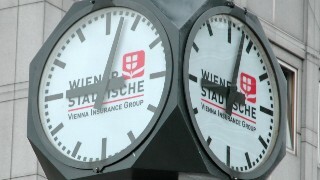
At the end of each year, Google tells us about the year in search. In 2020, our online life was bigger than usual, and dominated by symptoms and news headlines, but also sour-dough bread recipes and Zoom. One curiosity was that a key search was simply: What day is it? Time moved differently in the pandemic, and we lost track of days or even weeks.
A tour exploring the concept of TIME in Vienna. How fast are we moving into the future? Outsiders say we live in a sloooooow city.
How do culture and rhythm influence our perception of development? Language changes how we perceive time, and Viennese say 'Wie spät ist es? (how late is it?), not what time is it? This is a more stressful way to understand our day.
Eugene lives outside his own time zone (GMT - Greenwich Mean Time)
1500km away, and in a space which stretches from west Spain to east
Poland. The EU puts pressure on some countries to conform to the
middle - Italian/German - time space, and this makes less sense for
Hungarians, who walk home from school in October in the dark, and for
Galicians, who awake in darkness in winter.
Eugene likes the idea that our weather comes from the West, but the sun rises in the East. Indeed weather is one of the key ways we sense that time is moving on, as we notice days getting warmer or cooler.
Austrians write their address backwards, with family name
before 'first' name, their street name before flat & house number,
city name before the more local postal code. This is putting everything backwards.
wtf!
And of course, auf deutsch, numbers are said inversely, which creates
maximum confusion in international situations: 4-and-20, instead of
24. That '&' is not necessary and wastes our time. Euge's son
Josef continually says his Anglo numbers backwards, since he sees them in
German and says them in English, instead of in the logical sequence. He answers maths
answers in German, which are false in English. We need to make this
universal. Let's focus on mathematical efficiency!
Eugene finds it odd that, on English-language keyboards, €20.4bn is
expressed with a '.': (€20.4bn), whereas in German, €20,4bn uses
a comma (€20,4bn). In fact, points are more accurate than commas.
In the Anglo-world, we write numbers divided w '.' not ',': 20,000,
not 20.000.
Central European Time is expressed as CET - which is one hour ahead of Greenwich Meantime. And why is London the centre of the world? Because of the Imperial ambitions of UK.
Euge is insomniac, and therefore fascinated with time and how it passes, in both early morning and late at night.... I am both owl and lark. You find me in the morning and evening.
Eugene finds it fascinating that women smell differently to men, across time, depending on hormones, weather, fertility and age.
Eugene loves the night, and has been leading tours into this less-explored time, since 2017, with his roxy tour of every Vienna district, starting at midnight and ending 9am.
Time seems to move slowly in Wien, right? I find this intriguing. But
Why?